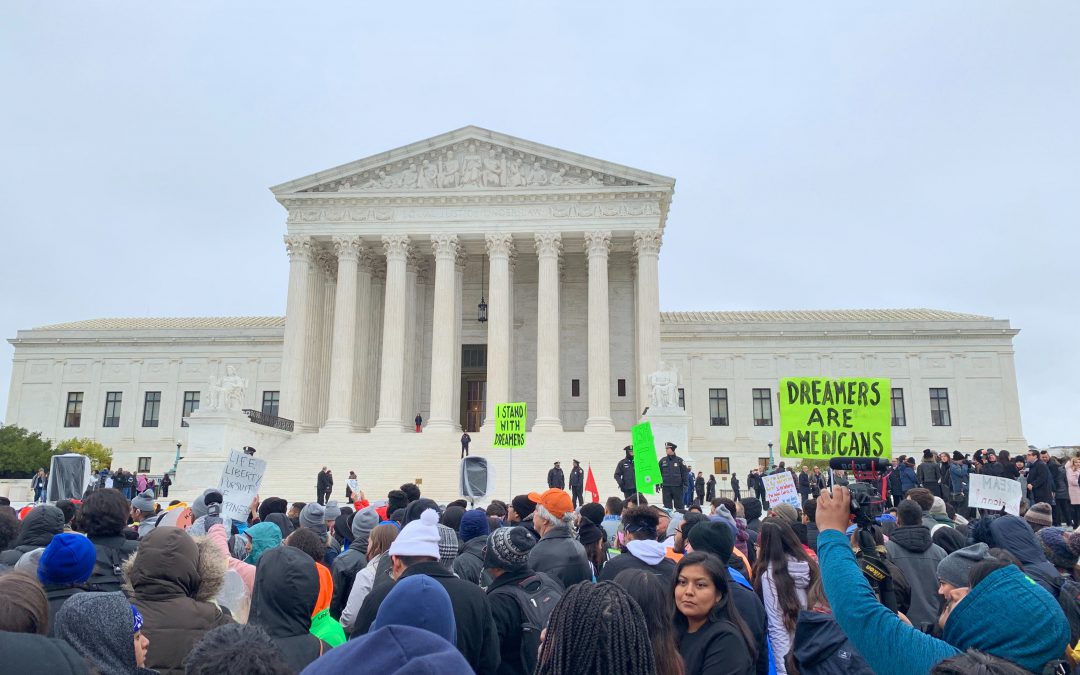WASHINGTON –The Supreme Court Tuesday seemed likely to back President Donald Trump’s efforts to end a program that protects from deportation 700,000 “dreamers,” undocumented immigrants who came to the U.S. as children, as conservative justices questioned arguments that Trump hadn’t provided a rational reason for his decision.
During an oral argument to review whether Trump acted lawfully in rescinding the Deferred Action for Childhood Arrivals program in 2017, the court’s conservative justices indicated that the administration had reasonably explained its decision, as required by federal law. They also seemed skeptical that they had the authority to review the repeal.
“What more would you have the government say?” Justice Neil Gorsuch asked the plaintiffs’ lawyers.
President Barack Obama created DACA through executive order in 2012, granting recipients work permits and reprieves from deportation on a renewable two-year basis. When Trump announced its planned phaseout, over 90 percent of DACA recipients held jobs and 45 percent were in school, according to a government study cited in analysis provided by the court.
“Because of that program, I was able to buy a home, get a job and pursue a career,” Leezia Dhalla, who came to the U.S. with her family in 1996, at the age of six, said in an interview. Dhalla, who was among thousands of DACA supporters rallying outside the Supreme Court, said her family became undocumented because a lawyer mishandled their paperwork.
“What people might not understand is that our entire life is built around this program,” Dhalla said.
Over the past two years, several states, corporations, and individual DACA recipients successfully challenged the administration in lower courts. In California, New York, and the District of Columbia, federal judges ruled that the effort to repeal DACA was based on faulty legal reasoning and that the administration failed to provide a strong rationale for ending the program. In June, the Supreme Court announced it would review the three decisions in one consolidated case.
Solicitor General Noel Francisco, who represented the Trump administration, said the repeal was a simple matter of a federal agency taking control of immigration enforcement and therefore did not require judicial review.
DACA was always intended to be “a temporary stop-gap measure” and the government “did not intend to maintain it in perpetuity,” Francisco said.
But the court’s liberal justices challenged Francisco’s arguments.
Justice Sonia Sotomayor said it is difficult to understand why the Trump administration considered DACA to be illegal and questioned if the administration had considered that ending the program might be a “choice to destroy lives.”
Justice Stephen Breyer reminded the court that Trump lied to dreamers about how his administration would protect them. He also noted hundreds of friend-of-the-court briefs were filed in support of the plaintiffs. One was from Microsoft Corp., whose CEO, Brad Smith, attended the oral arguments.
“It’s so frustrating to know that despite living in this country for over 20 years, there is nothing I can do to become documented,” Dhalla said. “This is where we [dreamers] belong because this is home.”
All eyes were on Chief Justice John Roberts, who is widely considered to be the pivotal vote in the case. In 2018, Roberts sided with the court’s conservative justices in approving the president’s travel ban. In June, he joined with his liberal counterparts in striking down the administration’s attempt to add a citizenship question to the 2020 census.
Throughout the argument, Roberts questioned both sides but pointed to lower court precedents suggesting that the administration had provided sufficient rationale for ending the program.
“The impact [of the DACA repeal] has been devastating,” said Missael Garcia, 29, a DACA recipient who came to the U.S. with his three siblings at the age of 12. He now works in Baltimore as an ESL instructor.
“I am hoping that we can win this fight. I hope that the Supreme Court makes the right decision,” said Garcia, who also was among the DACA supporters at the rally.
On Tuesday morning, Trump tweeted that “many of the people in DACA, no longer very young, are far from ‘angels.’ Some are very tough, hardened criminals.”
The court’s 5-4 conservative majority includes two Trump appointees, Gorsuch and Brett Kavanaugh. Justices are expected to decide on the case by the end of June.


